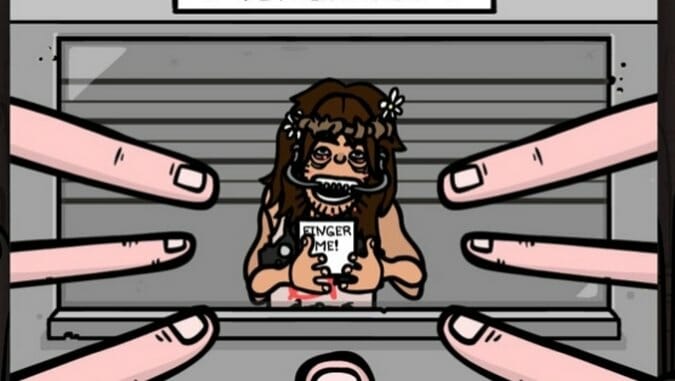Fingered: Juvenile Detention

One can almost hear the boorish chuckling that might’ve occurred during this game’s conception. “Boorish chuckling” is the best way to describe Super Meat Boy artist Edmund McMillen and programmer James Id’s short detective videogame Fingered, a game that, as the title might imply, dives head first into a pit of juvenile humor. That isn’t intrinsically a bad thing, but in this case, we find that the pit also houses stale, vapid gimmickry, along with satire so impersonal, so flippant and so hollow the very thought of calling this game “satire” is funnier than the game itself.
The player is tasked to choose a suspected criminal from a police line-up, with only four clues provided by a witness as aid. It’s simple process of elimination: see the clues and choose the suspect that’s closest to the descriptions in them. Some challenge comes from the player’s own judgements and interpretations of what the witnesses provide. What may be “ugly and clean” to one person, after all, might not be “ugly and clean” to another person. Here, we see Fingered’s core intentions: to lampoon the American justice system, specifically, on how it relies on biased, ignorant and uninformed perspectives instead of pragmatic facts. An intriguing topic to tackle, yet one Fingered executes with the grace and charm of a bad political cartoon. Characters are drawn in McMillen’s trademark combination of the cute and the grotesque. In his previous games, these two aspects would play off of each other effectively, giving ridiculous characters like Meat Boy a sense of goofy humanity. In Fingered, this art style—the game’s overall sense of humor, really—is at odds with what it’s arguing. Suspects are randomly generated from a pool of grotesque features and blatant stereotypes: what’s funnier than a poor man with a bindle? Hah-hey, a poor man with messy woman’s makeup, a disfigured face, a sign that says “I’m poor” AND a bindle! Oh, one of the witnesses is called Broken Berta and clearly has mental issues. What a fucking riot, man. Add a spoonful of twee cuteness in the mix, and we’re off to the races. Someone call the press, we got ourselves a regular Thomas Nast up in here! Nast’s racist cartoons are reflective of his time: in Fingered, McMillen failure to demonstrate any kind of political or social relevancy in his creations ends up presenting us with condescending, worthless caricatures that feel reflective of our own current “LMFAO RANDOM” Internet Age. The very FACT that these suspects are randomly generated reinforces this: it’s about mixing and matching stereotypical bullshit for cheap laughs rather than carefully crafting biting, valuable comedy.
As witnesses become kookier in nature, identifying the criminal becomes more restrictive and difficult. You have to take chances with clues that are “60% right.” Paranoid and shy witnesses introduce a time trial aspect. Certain characters introduce environmental obstacles that cloud (literally, at one point) suspects’ appearances. Here, the game’s design philosophy is revealed: trial-and-error. The last few scenes have you making split-second decisions or guesses. Gimmicks that try hard to create tension and variety are unspectacular in their execution. Still, you’ll probably fail many times. Don’t worry, you can start over! Again. And again. And again. I’m reminded of Italian developer Mollendustria’s McDonald’s: The Game, a tycoon sim that dissects the unethical and immoral decisions behind the conception, the growth, and propagation of McDonald’s as an all-consuming capitalist machine. As the game goes on, worker protests, healthcare companies, and scared shareholders make stabilizing your company’s income much more difficult. Laying off staff ends up biting you in the ass once underpaid, overworked and underappreciated working class people start retaliating. Eventually, your company will fall. Failure is almost always inevitable, but failure is a peculiar form of hope. McDonald’s chastises you sarcastically for losing. It knows. It understands. You are better off stopping here, it says. This system is corrupt, useless. Move on with what you’ve learned.
Fingered wants you to keep going. Fail once? Hey, here’s a second chance. Fail again, then a “Replay” prompt appears. I haven’t yet talked about what happens after you actually succeed in choosing the right suspect. You are taken to a new screen, the criminal in the center, strapped to an electric chair. “FINGER HIM” the game literally growls, the monstrous voice echoing. To your left, the switch. You pull it down. A deafening scream. “Sexy,” murmurs the creepy disembodied man voice that accompanies you throughout the game. “Disgusting,” it says some other times with repugnant smarm. A newspaper is then displayed, with your victim on the front page. “Oh no, he did [X] wacky crime!” Fail to get the right suspect? Boohoo, the game says, skeevily winking at you. But keep playing, it says. Keep indulging. You hit restart, and are greeted again by the same first witness, with the same looping, monotonous jazz bass track. And the cycle continues again.